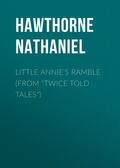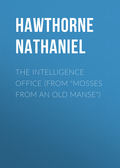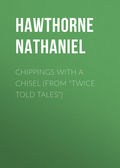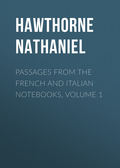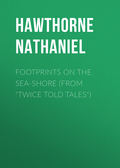
Натаниель Готорн
A Bell's Biography
So Deacon Lawson and half a score of his townsmen took down the bell, suspended it on a pole, and bore it away on their sturdy shoulders, meaning to carry it to the shore of Lake Champlain, and thence homeward by water. Far through the woods gleamed the flames of Our Lady's Chapel, flinging fantastic shadows from the clustered foliage, and glancing on brooks that had never caught the sunlight. As the rangers traversed the midnight forest, staggering under their heavy burden, the tongue of the bell gave many a tremendous stroke, – clang, clang, clang! – a most doleful sound, as if it were tolling for the slaughter of the priests and the ruin of the chapel. Little dreamed Deacon Lawson and his townsmen that it was their own funeral knell. A war-party of Indians had heard the report, of musketry, and seen the blaze of the chapel, and now were on the track of the rangers, summoned to vengeance by the bell's dismal murmurs. In the midst of a deep swamp, they made a sudden onset on the retreating foe. Good Deacon Lawson battled stoutly, but had his skull cloven by a tomahawk, and sank into the depths of the morass, with the ponderous bell above him. And, for many a year thereafter, our hero's voice was heard no more on earth, neither at the hour of worship, nor at festivals nor funerals.
And is he still buried in that unknown grave? Scarcely so, dear reader. Hark! How plainly we hear him at this moment, the spokesman of Time, proclaiming that it is nine o'clock at night! We may therefore safely conclude that some happy chance has restored him to upper air.
But there lay the bell, for many silent years; and the wonder is, that he did not lie silent there a century, or perhaps a dozen centuries, till the world should have forgotten not only his voice, but the voices of the whole brotherhood of bells. How would the first accent of his iron tongue have startled his resurrectionists! But he was not fated to be a subject of discussion among the antiquaries of far posterity. Near the close of the Old French War, a party of New England axe-men, who preceded the march of Colonel Bradstreet toward Lake Ontario, were building a bridge of logs through a swamp. Plunging down a stake, one of these pioneers felt it graze against some hard, smooth substance. He called his comrades, and, by their united efforts, the top of the bell was raised to the surface, a rope made fast to it, and thence passed over the horizontal limb of a tree. Heave ho! up they hoisted their prize, dripping with moisture, and festooned with verdant water-moss. As the base of the bell emerged from the swamp, the pioneers perceived that a skeleton was clinging with its bony fingers to the clapper, but immediately relaxing its nerveless grasp, sank back into the stagnant water. The bell then gave forth a sullen clang. No wonder that he was in haste to speak, after holding his tongue for such a length of time! The pioneers shoved the bell to and fro, thus ringing a loud and heavy peal, which echoed widely through the forest, and reached the ears of Colonel Bradstreet, and his three thousand men. The soldiers paused on their march; a feeling of religion, mingled with borne-tenderness, overpowered their rude hearts; each seemed to hear the clangor of the old church-bell, which had been familiar to hint from infancy, and had tolled at the funerals of all his forefathers. By what magic had that holy sound strayed over the wide-murmuring ocean, and become audible amid the clash of arms, the loud crashing of the artillery over the rough wilderness-path, and the melancholy roar of the wind among the boughs?



